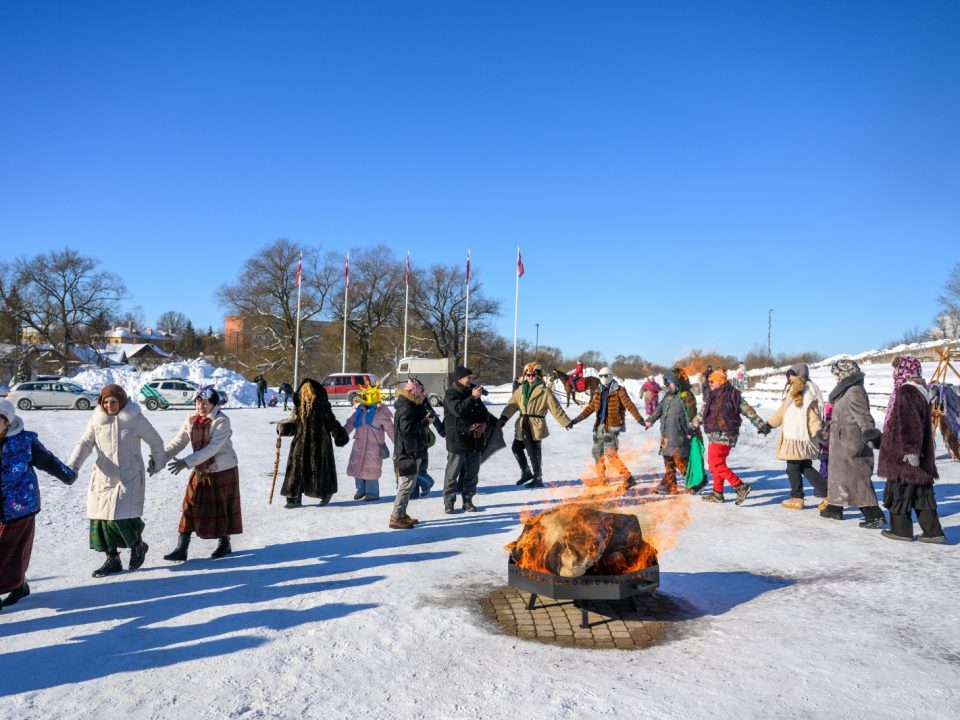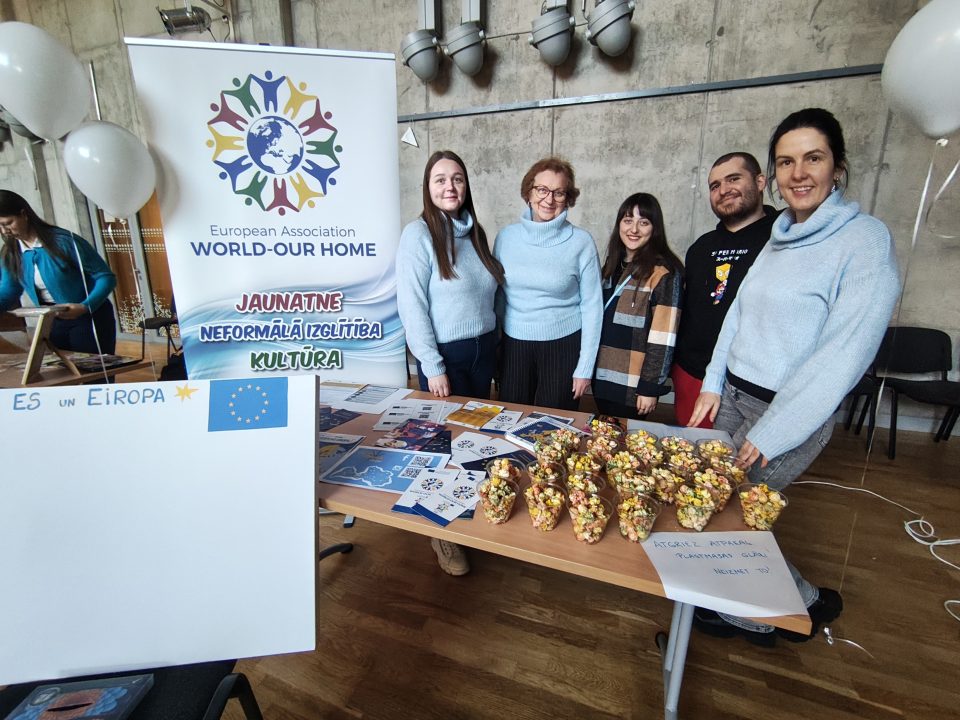European Association “World-Our Home” during whole year will organize online and offline youth activities to celebrate International days in 2021 through non-formal learning, encouraging young people to active participation in society.
Information about the dates and venues will be given before the celebrations in the website section NEWS.
Subjects: Cultural diversity, solidarity, tolerance, human rights, European cultural heritage.
9th May Europe Day
Europe Day is a day celebrating “peace and unity in Europe”. Europe Day is a day celebrated on 5 May by the Council of Europe and on 9 May by the European Union. The first recognition of Europe Day was by the Council of Europe, introduced in 1964. The European Union later started to celebrate its own European Day in commemoration of the 1950 Schuman Declaration, leading it to be referred to by some as “Schuman Day” or “Day of the united Europe”. Both days are celebrated by displaying the Flag of Europe. The aim of Europe Day was to facilitate European integration by fostering a Pan-European identity among the populations of the EC member states. The European Council adopted “Europe Day” along with the flag of Europe and other items on 29 June 1985 in Milan. Europe Day is a public holiday for employees of European Union institutions.
21th May World Day of Cultural Diversity
The World Day for Cultural Diversity for Dialogue and Development is a United Nations–sanctioned international holiday for the promotion of diversity issues. It is currently held on May 21. The United Nations General Assembly proclaimed this holiday due to UNESCO‘s Universal Declaration on Cultural Diversity in November 2001. Diversity Day, officially known as “The World Day for Cultural Diversity for Dialogue and Development”, is an opportunity to help communities understand the value of cultural diversity and learn how to live together in harmony. This day was created as a result of the destruction of the Buddha statues of Bamiyan in Afghanistan in 2001.
12th August International Youth Day
International Youth Day (IYD) is an awareness day designated by the United Nations. The purpose of the day is to draw attention to a given set of cultural and legal issues surrounding youth. The first IYD was observed on 12 August, 2000. International Youth Day is observed annually on August 12th. It is meant as an opportunity for governments and others to draw attention to youth issues worldwide. During IYD, concerts, workshops, cultural events, and meetings involving national and local government officials and youth organizations take place around the world.
15th September International Day of Democracy
The international conferences on new and restored democracies began in 1988 under the initiative of President of the Philippines after the so-called peaceful “People Power Revolution” overthrew the 20-year dictatorship of Ferdinand Marcos. Following up on the outcome of conferences, an advisory board set up by the chair of the process decided to promote an International Day of Democracy. At the suggestion of the conference participants, on 15 September (date of the Universal Declaration on Democracy) was chosen as the day when the international community would celebrate each year the International Day of Democracy.
In 2007 the United Nations General Assembly resolved to observe 15 September as the International Day of Democracy—with the purpose of promoting and upholding the principles of democracy—and invited all member states and organizations to commemorate the day in an appropriate manner that contributes to raising public awareness. While democracies share common features, there is no single model of democracy and that democracy does not belong to any country or region, democracy is a universal value based on the freely-expressed will of people to determine their own political, economic, social and cultural systems, and their full participation in all aspects of life.
26th September European Day of Languages
The European Day of Languages is observed 26 September, as proclaimed by the Council of Europe on 6 December 2001, at the end of the European Year of Languages (2001), which had been jointly organised by the Council of Europe and the European Union. Its aim is to encourage language learning across Europe. The general objectives of the European Day of Languages are to: 1)Alert the public to the importance of language learning, diversity and the range of languages learned in order to increase plurilingualism and intercultural understanding; 2)Promote the rich linguistic and cultural diversity of Europe; 3)Encourage lifelong language learning in and out of school.
On the occasion of the day, a range of events are organised across Europe, including those for children, television and radio programmes, language classes and conferences. The events are not organised by the Council of Europe or the European Union nor do they allocate special funding (i.e. apart from their existing language programmes) for the day. Member states and potential partners are given a free hand to organise activities.
16th November International day for Tolerance
The International Day for Tolerance is an annual observance day declared by UNESCO in 1995 to generate public awareness of the dangers of intolerance. It is observed on 16 November. Every year various conferences and festivals are organized in the occasion of International Day for Tolerance.
18th November Celebration of Proclamation Day of the Republic of Latvia
Proclamation Day of the Republic of Latvia is celebrated annually on 18 November. It marks the anniversary of the Proclamation of Independence of Latvia by the People’s Council of Latvia in 1918. Various public events take place all over the country, including concerts and fireworks. Torchlight processions held by various organizations have been part of Proclamation Day celebrations and Lāčplēsis Day celebrations since the 1920s. A popular modern tradition established in 2009, is for people all over the world to sing the Latvian national anthem Dievs, svētī Latviju! at the same time.
3rd December International Day of Persons with Disabilities
The annual observance of the International Day of Disabled Persons was proclaimed in 1992. It aims to promote the rights and well-being of persons with disabilities in all spheres of society and development, and to increase awareness of the situation of persons with disabilities in every aspect of political, social, economic and cultural life. Thursday, 3 December 2020 is the International Day of Persons with Disabilities.
10th December Human Rights Day
Human Rights Day is celebrated annually across the world on 10 December every year.
The date was chosen to honor the United Nations General Assembly’s adoption and proclamation, on 10 December 1948, of the Universal Declaration of Human Rights, the first global enunciation of human rights and one of the first major achievements of the new United Nations.
The day is normally marked both by high-level political conferences and meetings and by cultural events and exhibitions dealing with human rights issues. Besides, it is traditionally on 10 December that the five-yearly United Nations Prize in the Field of Human Rights and Nobel Peace Prize are awarded. Many governmental and non-governmental organizations active in the human rights field also schedule special events to commemorate the day, as do many civil and social-cause organisations.
20th December International Human Solidarity Day
The International Human Solidarity Day observed on December 20, is an international annual unity day of the United Nations and its member states introduced by the general assembly during the 2005 World Summit. It was established on December 22, 2005. Its main goal is to recognize the universal values of poor by making the associated countries aware of reducing poverty and to formulate its countermeasures as signed by the independent states. IHSD is a part of World Solidarity Fund and United Nations Development Programme focused on to achieve goals set for worldwide poverty eradication. IHSD is held every year on December 20 to promote the importance of sharing and the culture of solidarity to combat poverty and to encourage governments, NGOs, and almost every individual to organise programmes and debates either on a national or international level so that poverty can be reduced by spreading the awareness. An individual can participate or celebrate the day either by contributing to education or help the poor. This day is also celebrated by helping socially or mentally challenged people.






